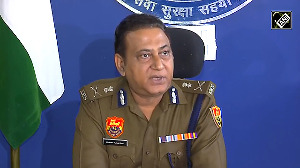The Indian Meteorological Department today cautioned that after-shocks of the massive earthquake that struck Indonesia and Andaman and Nicobar islands would continue in the coming days.
Dr A K Shukla, Director at IMD seismological division, told PTI that southern Indian coast belt was 'still experiencing after-shocks which may continue in the coming days'.
However, in course of time, the intensity and frequency of aftershocks diminishes, he said.
- Also See:
Tsunami hits south India; over 1,000 dead
What is a tsunami?
Tidal waves lash Tamil Nadu coast, several dead
Tidal waves hit Andhra Pradesh coast, several dead
Earthquake in Andaman and Nicobar Islands
Quake in eastern India, one dead in WB
Tidal waves pound Sri Lanka, hundreds dead
Shukla said the Andaman earthquake measuring 7.3 on the Richter Scale occurred after the Sumatra Island quake.
"It is a kind of new experience - there were two earthquakes of great magnitude. One in Sumatra and the other in Andaman," Dr Rajesh Prakash, another Director at the IMD seismological division, said.
He said IMD observatories are recording the aftershocks and a report would be compiled in the coming days.
A report on the crustal structure on the affected areas would be compiled with involvement of agencies like Geological Survey of India and National Geophysical Research Institute (NGRI).
The department had installed about 15 monitoring devices in south India, which are picking up signals, Prakash said.
Though the areas affected in India are not prone to earthquake, the damage has resulted from the tidal waves resulting from the two earthquakes.
Tidal waves resulted as the earthquake had its origin under water. India has earlier recorded such earthquakes in the Indian Ocean and Bay of Bengal but these were not associated with this scale of damage, Prakash said.
Whenever an earthquake of magnitude of 8.5 or more occurs in the sea, it may trigger tsumani, or tidal waves.
"Since it was a great earthquake, it was associated with a large amount of energy release. Such great earthquakes always cause more damage in surrounding areas," he said.
Shukla said that the Sumatra quake was the strongest since 1941 when the Andaman Islands were hit by an earthquake measuring 8.1 on the Richter Scale.
Japan has more experience of such underwater quakes, Shukla said.
Dr Manjit Roy Agnihotri, an architect related to earthquake prone areas, said that Earth's tectonic plates keep moving. These plates, and fault lines in the crust, extend under the water as well.
All coastal areas actually face a risk from quakes occurring under the water. Another problem is that earthquakes do not give prior warning, Agnihotri said.
India should always be prepared as 56% of the country's landmass falls in an earthquake prone zone, he said.






 © 2025
© 2025